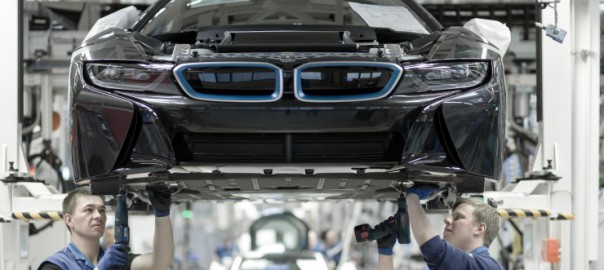Following the successful launch of the ‘i’ sub-brand, BMW is now expanding production capabilities in anticipation of electrifying its conventional fleet of vehicles.
Two new production lines building electric motors and the lithium-ion battery packs that supply them with energy have been commissioned for the German carmaker’s Dingolfing plant. More than 200 additional staff are expected to operate the lines, which are said to cost “a high double-digit million euro amount” over the next five years.
It’s an essential expense for BMW, which has plans to offer plug-in hybrid versions of models ranging from the 7 Series limousine to the X5 SUV to the humble 3 Series, its best-selling car. The company has expertise in building electric hardware for the i3 and i8 in-house; the next step is to integrate the technology in its high-volume vehicles.
The technology will arrive under the ‘eDrive’ banner, with electric motors mated to highly efficient turbocharged gasoline engines, delviering outstanding overall fuel economy and the ability to travel reasonable distances solely using electric power. BMW’s incipient plug-in hybrids are also likely to be fast, developing in excess of 250 hp from their two power sources.
While the BMW i8 supercar (review) was BMW’s first plug-in hybrid, at $136,000 it is exclusive. Standard ‘eDrive’ plug-in hybrids will be more affordable, and although a slight premium is expected, they will broadly match gasoline-only models in price. Hardware for both the ‘i’ and ‘eDrive’ models will be built on the same lines, with the X5 eDrive the first of the new breed to arrive in 2015.
BMW is well placed to capitalize from consumers who are increasingly aware of the benefits of plug-in hybrid technology and are already loyal to the brand. It will, however, face competition from Audi, Mercedes-Benz, and Volvo, all of whom are preparing for widespread electrification of the their model lines.
Source: EcoMento
